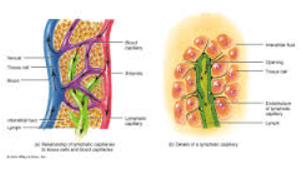By Sarah Wilkinson LLB, BSc (Psychology), Diet and Nutritional Dip.
An immune enhancing body system – the lymphatic system
The lymphatic system is an un-sung hero of your body. It plays a key role in returning leaked fluids, and draining waste products from the interstitial area back into blood circulation.
The lymphatic system removes foreign cells, proteins, and carries absorbed fats via a one-way highway towards the heart, as well as playing a key role in immunological defence. Lymphocytes, T cells, and B cells are the main fighters of the lymphatic system. These guys create an immune response when pathogens, bacteria, viruses and cancer cells are located.
Lymphocytes, phagocytes, and macrophages (key immune system cells) act through permeable lymphatic capillaries. Lymphatic capillaries are a good example of where form follows function, as they are composed of endothelial cells, loosely connected, allowing pathogens, bacteria, viruses, and cancer cells to enter. Lymphatic capillaries collect excess fluid, and are found throughout the body except in bones, teeth, and the spinal column.
Disease causing cells collected by lymphatic capillaries, have to pass through lymph nodes which cleanse, and filter the collected micro-organisms. There are hundreds of lymph nodes throughout the body, predominately around the neck, arm pit, and groin. Lymph nodes become swollen due to the number of antigens the lymph has collected, and is trying to destroy. Lymph nodes do regenerate, however, a decrease in lymphatic function can led to decreased immune function, fat accumulation, and tissue swelling.
Edema occurs when the return of lymph to the blood is prevented, causing swelling, due to excess fluid in the interstitial space. Edema is part of the inflammatory response, and as such is vital for tissue repair. Prolonged edema may be a sign the lymphatic system is not functioning effectively maybe due to:
- excess protein loss due to extensive burns, wounds, and kidney diseases,
- inadequate protein synthesis due to liver diseases, or
- an inadequate dietary intake of proteins.
Unlike the other circulatory systems the lymphatic system lacks a pump, therefore, movement, muscle activity, and exercise is important to increase lymphatic flow. Other lifestyle practices important for immune and lymphatic function include a good diet rich is vitamins, and mineral, including adequate vitamin C. Vitamin C is a power antioxidant helping stabilise free radicals within your body, helping enhance immune system functioning.
The lymphatic systems also manufactures antibodies that respond to invasion by foreign substances. Due to the lymphatic systems immune enhancing role, knowing it lacks a pump, but is responsible for draining excess fluid, filtering, and fighting, make sure you take care of your body by moving well, exercising often, and eating well!
For more information about the lymphatic system, or any concerns or questions make sure you check in with you health practitioner.
References
Alitalo, K. (2011). The lymphatic vasculature in disease. Nature Medicine, 17(11), 1371-80. doi:10.1038/nm.2545.
Haas, E, M. (2006). Staying healthy with nutrition: the complete guide to diet and nutritional medicine. NewYork, USA: Celestial Arts.
Marieb, E. N., & Hoehn, K. (2012). Human anatomy and physiology (9th ed.). Menlo Park, CA: Benjamin Cummings.
McLafferty, E., Hendry C., & Farley, Alistair. (2012). The lymphatic system. Nursing Standard, 27(15-17), 37-42. Retrieved from http://web.b.ebscohost.com/ehost/detail/detail?vid=8&sid=9143a91e-7a72-4c97-8da7-8794fca10a83%40sessionmgr115&hid=107&bdata=JnNpdGU9ZWhvc3QtbGl2ZQ%3d%3d#db=rzh&AN=2011794172
Murray, M., & Pizzorno, J. (2012). Encyclopaedia of natural medicine (3rd ed.). New York, America: Atria Paperback.




